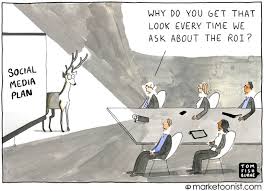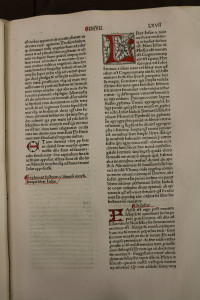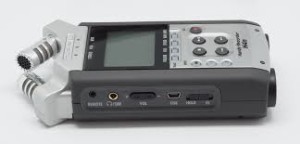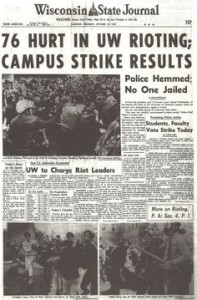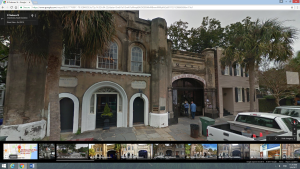I interviewed Steve Barrett, an archivist at Idaho State Archives. Since I am currently interning at the special collections in Albertson’s Library, I thought it would be interesting to look deeper into a career in archiving. He was extremely helpful and I learned so much while talking with him.
What path did you take to get to your current position?
Steven Barrett has his PhD in American literature and obtained the position of archivist through unexpected channels. After following his wife to Boise when she got a job as a professor of literature at Boise State, Barrett started out volunteering at any location in which he might want a job. After starting out as a volunteer with the Boise library he eventually climbed the ladder there while still volunteering at Idaho State Archive in their research center. Climbing the ladder in the Historical Society in Boise, he worked as management assistant for the entire historical society for three years and then back into the Archive where he has been for the last few years. Barrett explained, “You don’t necessarily have to be a history major to work for a state archives. And in my case you can’t understand American Literature if you don’t understand American History.” Most people in the research center have library degrees or backgrounds and the workers in the archive usually come from history backgrounds.
Do you have a favorite project that you’ve worked on over the years? Is there anything that stands out?
Barrett explained that every project he is currently working on tends to be his favorite. One special project, however, is the Abraham Lincoln collection belonging to David Lee Roy who used to be Lieutenant governor under Cecil Anders. Roy has been collecting Lincoln artifacts for decades and Barrett commented that his house is essentially a museum. Roy has donated a section of his collection to the State Archive who plan to create a five room exhibit out of it. Barrett plans to work with a volunteer who has an MA from King’s College in London to build Lincoln’s cabinet room as well as four other rooms featuring documents and artifacts from different eras in Lincoln’s life.
What kind of issues or problems do you see occurring in the archive or historical world?
Barrett surprised me with his first ‘issue,’ he explained that one problem the archive world is by 2017 Idaho wants to go completely digital. Federal and state documents will never occur outside a digital form. As Barrett explained, “That’s great as long as the power is on.” It would then be up to the archive to store the digital document in perpetuity. Like we discussed in Digital History, the constant migration of the documents causes degradation and there’s also the progression of technology that may cause issues for preservation. How do archives store the massive amount of material then? Hard drive on shelf? A server? “Paper is still the most enduring record. Will we have records created today 100 years from now when they’re created digitally? No body knows. I call it the second Dark Ages.”
You mentioned Business Model, which is something that we have discussed in our class. Do you see anything positive in moving towards a business model?
Barrett is a believer in the “public service model” when it comes to the state archives where “…we’re not nickel and diming everything that we do. It alienates people, it alienates me!” He does, however, find one positive feature being implemented with the business model approach. This approach forces the archives to be efficient. He explains that agencies with plenty of funding and money get ‘sloppy.’ Informality means that different ideas and goals may or may not get done. The business model approach may not be as friendly, but it certainly gets things done. He commented that in his perfect wold they would have a public service business model because, “Right now we’re losing public service.”
Is there anything specific you’re looking for when hiring for a position in the archives?
He explained that the big thing he sees is you need to have to have masters. He explained that when you apply for a position at the archives you could have a high school diploma and still do a lot of what they’re doing. You could have bachelors and definitely do what they’re doing. However, when you are part of a pool of 70 people applying for a position that is as basic as it gets, you’re competing with people with a masters and maybe PhDs. “That’s the economy, and that’s the economy it’s been for 10 years now. It’s just the numbers.”
Any recommendations or advice for a person looking to break into the business?
He suggests we look for project management positions where you’re working on and creating exhibits for one project. Look for those because the more experience you have the better of you’ll be. Always volunteer. Volunteer at museums, archives, libraries, anything, and get that experience so you can talk about your experience when applying. If you get a chance to work on a project like the Lincoln exhibit as a volunteer then jump on it. “If you’ve been project manager on stuff like that in a couple different states then you show that you’re willing to move around the country and that you can do diverse work, have leadership skills, so that then you’re going to be a strong candidate when a position opens up.”
Barrett then gave me the advice that he said was most influential in his life, “When I was in the 8th grade in my algebra class, of all places, my algebra teacher said, ‘The most important lesson you can learn here, in life, is change and adaptability. You are going to experience so much change in a lifetime that being able to adapt to whatever comes down the road is the most important skill you can developed. And I’ve worked with a lot of people who did not learn that, who did not have that skill, and I don’t work with them anymore. This would have been in the 70’s and look at what I’ve seen since… I just think, thank God she said that to me and thank God I heard it… I just want to pass on this incredible bit of wisdom I got in the 8th grade and that’s adapt, adapt, adapt.”
